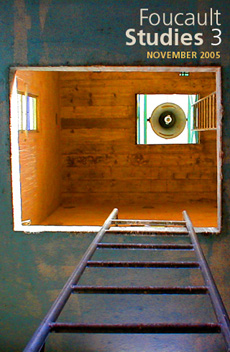Freedom, Truth, and Possibility in Foucault's Ethics
DOI:
https://doi.org/10.22439/fs.v0i3.872Abstract
Like Kant, Foucault challenges us to rethink the way we relate freedom and truth by stressing the idea of "maturity" understood as a release from the "self-incurred tutelage" (the expression is from Kant) that otherwise characterizes so much of our lives. Though, rather than linking freedom and truth via the concept of autonomy (or lawfulness), as Kant does, Foucault outlines a possible experience of ethics as an individualizing ideal that contrasts with the model of establishing codes within a conception of moral order. Foucault's project can be read as attempting to decouple ethics from the epistemological concern with the objectivity of a moral order in order to reconnect it to the formation of a political sensibility that sees truth(fulness) in a certain practice of freedom, as opposed to seeing our freedom confirmed or granted by a certain kind of (mode of relating to the) truth. I call this reading of Foucault's investigations into ethics the "methodological/prescriptive" approach (asking and responding to what we can do, ethically-speaking) and contrast it with the sketch of an alternative reading which I call "ontological/historical" (asking and responding to what we are, ethically-speaking). This reading, instead of pushing beyond Kant in the direction of a Nietzschean sensibility, rather challenges Kant's moral law from the space of a Hegelian insistence on the (historical) realization or actualization of freedom in and through the normative constraints structuring existing power-relations.Downloads
Published
2005-11-01
How to Cite
Fillion, R. (2005). Freedom, Truth, and Possibility in Foucault’s Ethics. Foucault Studies, (3), 50–64. https://doi.org/10.22439/fs.v0i3.872
Issue
Section
Articles
License
Authors retain copyright to their work, but assign the right of the first publication to Foucault Studies. The work is subject to a CC BY-NC-ND 4.0 license, but despite these restrictions, authors can take for granted that Foucault Studies will permit articles published in Foucault Studies to be translated or reprinted in another format such as a book providing a full reference is made to Foucault Studies as the original place of publication.



